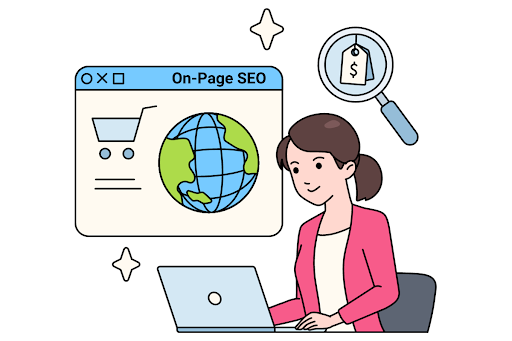In this digital world, having a strong online presence is crucial for businesses of all sizes. Whether you’re a small local shop or a multinational corporation, the internet is where your potential customers are searching for products and services. However, simply having a website isn’t enough. To truly succeed online, you need to ensure that your website is easily discoverable by search engines and provides a seamless user experience. This is where On-Page SEO services come into play.
Understanding On-Page SEO and Why You Need These Services for Your Online Success
Definition and Basics of On-Page SEO
On-page SEO, or search engine optimization, is the practice of optimising individual web pages to rank higher in search engine results and attract more organic (non-paid) traffic. Unlike off-page SEO, which focuses on external factors like backlinks, On-Page SEO involves optimising elements on your website itself.
Key Elements of On-Page SEO
Here are the Key Elements of On-Page SEO Services:
1. Keywords and Content Optimization: Careful selection and placement of relevant keywords in your content.
2. Meta Tags and Descriptions: Crafting compelling meta titles and descriptions that entice users to click.
3. URL Structure: Creating user-friendly and search engine-friendly URLs.
4. Internal Linking: Building a logical and organised internal linking structure.
5. Image Optimization: Optimising images for faster loading times and better user experience.
6. Mobile Responsiveness: Ensuring your site is mobile-friendly.
7. Page Load Speed: Improving website load times for better user engagement.
8. User Experience and Engagement: Enhancing the overall user experience, including readability, navigation, and accessibility.
Benefits of On-Page SEO Services

Investing in On-Page SEO services offers several significant advantages:
Improved Search Engine Rankings: Higher visibility in search results means more potential customers finding your website.
Enhanced User Experience: A well-optimized website is easier to navigate, making it more appealing to visitors.
Increased Organic Traffic: As your rankings improve, so does your organic traffic, reducing your reliance on paid advertising.
Better Conversion Rates: When your website is optimized for both search engines and users, you’re more likely to convert visitors into customers.
Competitive Advantage: Outperforming competitors in search results can give you a significant edge in your industry.
Long-Term Sustainability: Effective On-Page SEO creates a strong foundation for long-term online success.
How On-Page SEO Services Work
On-Page SEO services typically follow a structured process:
SEO Audit and Analysis: A thorough analysis of your website’s current SEO status and areas for improvement.
Keyword Research and Optimization: Identifying relevant keywords and optimizing content to target them effectively.
Content Creation and Optimization: Developing high-quality, keyword-rich content that appeals to both users and search engines.
Technical SEO Implementation: Making technical improvements to enhance website performance and search engine visibility.
User Experience Enhancement: Improving website design, navigation, and usability.
Monitoring and Analytics: Ongoing tracking and analysis to measure the effectiveness of SEO efforts and make necessary adjustments.
On-Page SEO Checklist
Here’s a concise on-page SEO checklist:
- Conduct Keyword Analysis: Discover pertinent keywords to enhance your content.
- Craft Exceptional Content: Produce content that is both insightful and innovative, captivating your audience.
- Seamlessly Integrate Keywords: Artfully incorporate keywords into titles, headings, and content.
- Enhance Meta Tags: Elevate meta titles and descriptions through strategic keyword inclusion.
- Image Enhancement: Improve images with descriptive file names and alt tags.
- Prioritize Mobile Compatibility: Guarantee your website is adaptable and user-friendly on mobile devices.
- Accelerate Page Loading: Boost load times for an improved user browsing experience.
- Foster Internal Connections: Establish links to interconnected pages within your website.
- External Links: Include authoritative external links when relevant.
- User-Friendly URLs: Use clean and descriptive URLs.
- Header Tags: Organize content with H1, H2, and H3 tags.
- SSL Certificate: Secure your website with HTTPS.
- Social Sharing: Include social sharing buttons for content.
- XML Sitemap: Submit a sitemap to search engines.
- Regular Updates: Keep content fresh and up-to-date.
- Mobile-First Indexing: Prioritize mobile optimization.
- Local SEO: Optimize for local searches with accurate NAP (Name, Address, Phone) information.
- Structured Data: Implement schema markup for rich snippets.
- Monitor Analytics: Track website performance with tools like Google Analytics.
- User Experience (UX): Focus on a seamless and enjoyable user experience.
Choosing the Right On-Page SEO Service Provider

Selecting the right On-Page SEO service provider is crucial for optimizing your website’s visibility on search engines and attracting organic traffic. Here are some points to consider when making your selection:
1. Experience and Expertise: Look for providers with a proven track record in On-Page SEO. Check their portfolio and client testimonials.
2. Knowledge of SEO Best Practices: Ensure the provider is up-to-date with the latest SEO algorithms and best practices.
3. Customization: A one-size-fits-all approach may not work for your specific website. The provider should offer a customized strategy tailored to your niche and goals.
4. Technical SEO Skills: Assess their ability to handle technical SEO aspects, including site architecture, URL structure, XML sitemaps, and robots.txt.
5. Content Optimization: Check if they have a content optimization strategy in place, including optimizing titles, meta descriptions, headers, and images.
6. User Experience (UX): UX is a crucial ranking factor. Ensure the provider can improve user experience through responsive design and easy navigation.
7. Local SEO (if applicable): If you have a local business, make sure the provider understands local SEO techniques, including Google My Business optimization.
8. Monitoring and Reporting: The provider should offer regular reports and analytics to track progress and make necessary adjustments.
9. Ethical Practices: Avoid providers who engage in black-hat SEO techniques, such as keyword stuffing or link schemes, as this can harm your website’s reputation.
10. Cost and Budget: Compare pricing and services offered by different providers. Be cautious of unusually low prices, as quality SEO services require investment.
Now, let’s explore some unique points to avoid plagiarism when discussing On-Page SEO Services with your service provider:
11. Content Originality: Emphasize the importance of creating original and unique content. Plagiarized content not only harms SEO but can also lead to legal issues.
12. Proper Attribution: Ensure the provider understands the necessity of citing sources and giving credit where it’s due, especially when using external data or quotes.
13. Duplicate Content Check: Ask the provider if they have tools or processes in place to regularly check for duplicate content within your website or across the web.
14. Content Paraphrasing: Discuss their approach to paraphrasing content if it’s necessary to use information from other sources. It should be done ethically and without compromising quality.
15. Content Freshness: Encourage the provider to focus on updating and refreshing existing content regularly to maintain its relevance and uniqueness.
16. Copyright Compliance: Discuss the importance of respecting copyright laws and obtaining proper permissions when using images, videos, or other media on your website.
By considering these points and emphasizing the importance of original, high-quality content, you can work with an On-Page SEO service provider who not only improves your website’s search engine ranking but also maintains its integrity and professionalism. Check out these top 10 digital marketer qualities that you should consider when searching for the perfect candidate.
On-page SEO Tools
On-page SEO tools are software applications or online resources that help website owners and digital marketers optimize their web pages to improve search engine rankings and enhance user experience. These tools are essential for ensuring that your website’s content is properly optimized for search engines like Google, Bing, and Yahoo. Here are some popular on-page SEO tools and the features they typically offer:
1. SEMrush: SEMrush is an all-in-one SEO tool that offers a range of features, including on-page SEO analysis. It provides insights into keyword optimization, content recommendations, backlink analysis, and competitor research.
2. Ahrefs: Ahrefs is primarily known for its backlink analysis capabilities, but it also offers on-page SEO features. Users can analyze their content’s performance, check for broken links, and research keyword opportunities.
3. Moz Pro: Moz Pro offers on-page optimization tools, including keyword research, rank tracking, and site audits. It provides actionable recommendations to improve your website’s on-page SEO.
4. Google Search Console: This free tool from Google allows website owners to monitor their website’s performance in Google’s search results. It provides data on search queries, indexing issues, and other on-page SEO insights.
5. Screaming Frog SEO Spider: This desktop tool crawls your website and provides a detailed analysis of on-page SEO elements, including meta tags, headers, broken links, and duplicate content.
8. Grammarly: While primarily a grammar and spelling checker, Grammarly can help improve the readability and quality of your content, which indirectly affects on-page SEO.
9. SurferSEO: This tool analyzes top-ranking pages for a given keyword and provides optimization recommendations, helping users align their content with the search engine’s expectations.
10. PageSpeed Insights: A tool from Google that analyzes the loading speed of your web pages. Fast-loading pages are considered a crucial on-page SEO factor for user experience and search rankings.
11. Copyscape: This tool checks for duplicate content on your website, helping you avoid issues with duplicate content penalties.
12. LSI Graph: LSI (Latent Semantic Indexing) keywords are important for on-page SEO. LSI Graph helps you find related keywords to include in your content.
These tools can be used individually or in combination to optimize various aspects of your website’s on-page SEO. Keep in mind that on-page SEO is an ongoing process, and regularly monitoring and adjusting your content is essential for maintaining and improving your search engine rankings.
Conclusion
In the ever-competitive online landscape, On-Page SEO services are essential for achieving and sustaining success. They not only improve your website’s visibility but also create a better user experience, ultimately leading to higher conversion rates and long-term growth. To thrive online, invest in On-Page SEO Services and choose the right service provider to help you navigate the dynamic world of digital marketing.

Pingback: Streamline SEO with Studio Tools - Digimarco
Comments are closed.